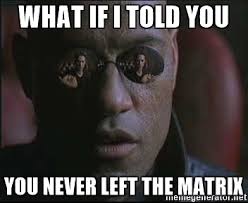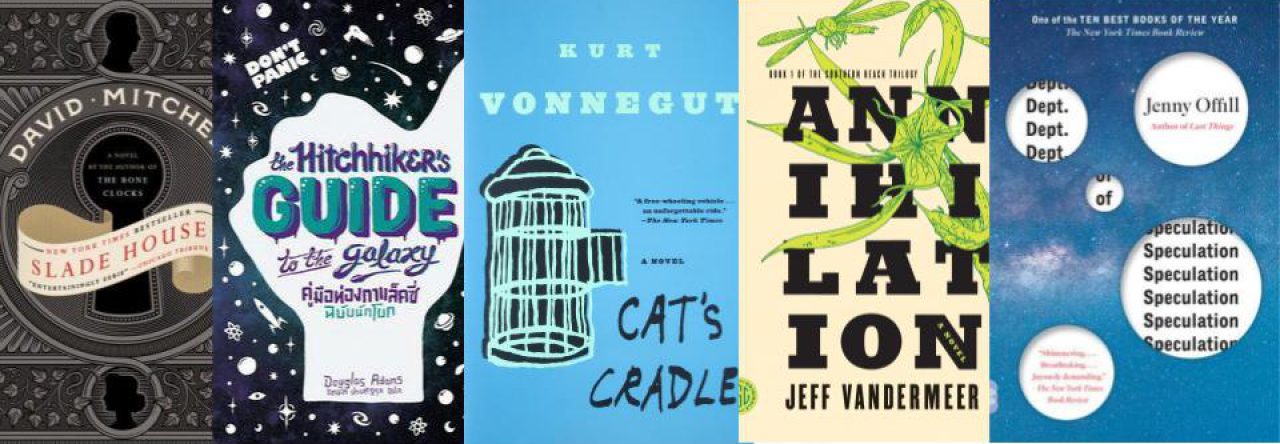When I was first introduced to this novel, one which I have honestly never heard of before, I immediately found myself in the comfortable position of having a surrounding background of knowledge that should be able to guide me through, utilizing certain tropes and conventions. While I may have never intentionally gone out of my way to read a work of fiction in this genre, thriller or science fiction, I have consumed massive amounts of media that have familiarized me enough with the expectations and values of the genre such that I feel well prepared to tackle the undoubtedly thick layers of Annihilation. I am well aware that the covers of different print books will differ greatly, but the basic premise combined with the artwork depicting a beautiful yet menacing plant on the forefront is what really drew me in. In such a manner, knowing that the genre is science fiction, and can be seen as a sort of thriller, I sought comfort in my childhood memories of Little Shop of Horrors. Much like the carnivorous plant from Little Shop of Horrors, perhaps the “great evil” did not start off as such a horrendous creature, but was through our nurturing as a species that the monster came to be. The everlasting theme of the survival of the fittest finally shone through. Perhaps it would be a tale that begins with man’s best intentions, looking to further our own well-being while making advancements that could very well benefit the world at large with agricultural industrialization, but my fore-knowledge of the genre made me much more prepared to read for subtle allegories, cautionary tales, and the like.
The book begins with four scientists, all of whom remain unnamed, crossing the border to a mysterious and condemned area known only as “Area X”. The name alone sounds intimidating enough, but the fact that every single other expedition team before the current one has gone missing is the real kicker here. How and why did these previous search teams vanish? Who knows, but it’s questions like this, and being in an element of the deep, dark, unknown of a world we still barely understand, that give this novel an element of thriller and, perhaps, even vibes of horror. After all, the reader may not feel incredibly connected to any of the protagonists in particular at this point in the story, but we are still able to connect with them as human beings and as cogs in the machine in which we are all expected to play our specific roles in. If nothing else, we are able to empathize with the protagonists by the specific role, or function, that they have been given in the machine before the events of the novel even took place. Specifically, we are dealing with the surveyor, anthropologist, biologist, and a psychologist. The psychologist is perhaps the most interesting wrench thrown into the story here. We come to learn as readers that it is specifically her job to subdue the rest of the crew via hypnosis whenever deemed necessary. Adding a crack further to this dynamic is that the biologist soon discovers that unknown spores she may have ingested could make her immune to this hypnosis, leading for an explosion of drama and excitement that honestly makes me not want to put this book down. That’s all we get, so far because, due to the unique way in which this particular novel was written, the paperback novel is actually meant to be a sort of collection of field journals.
Overall, it is my belief that the two most dominating controlling values for Annihilation is the never ending struggle between two opposing ideologies: should human beings use every means at their disposal to better their own lives, even at the risk of permanently changing the environment, or should we be satisfied enough in the state of technology and advancement we have now as to not risk permanent negative effects with onward pushes? The environment of Area X seems to exemplify the struggle between these values. The biologist notes a strange sound that is heard every night coming from a distance:
“All you heard was the low moaning. The effect of this cannot be understood without being there. The beauty of it cannot be understood, either, and when you see the beauty in desolation it changes something inside of you. Desolation tries to colonize you.” (Pg. 5-6)
This example illustrates the point perfectly. For one of the sets of controlling values within the confines of this narrative, the innate desire of man to innovate. That is to say, if is it perhaps better for human beings to accept their blessings as they are to an extent, living themselves happily and comfortably in the world that they have come to know, or if the risk of pushing the boundaries for something new, and potentially far greater, would be worth the inherent risk.
Does our meddling, for all of the technological wonders and boons that it brings, ultimately lead to our downfall. The howling almost seems to call out as if nature is giving the humans a warning. This has been a longstanding fear of the human race since the day that our species was first successfully able to ignite flame. Does the flame itself harm? Possibly, yes indeed it can, but so long as it is handled correctly, the capacity to be able to wield fire brings a near-endless supply of benefits to human society. In such a case, using technology to harness the power of nature for our own benefit can and should definitely be seen as a positive thing, and as such, an example of its corresponding controlling value winning out, at least temporarily. In addition, the idea of “desolation tries to colonize you” implies nature is fighting back. That in our downfall, nature will be the one to control us, not us controlling nature.
On the other hand, what if the future depicted in Annihilation is anything but the dystopian future with possibilities of dangerous outliers that we, the readers, were first meant to believe? Early on in the book, It is clear from the very first few pages of the novel that the narrator has several misgivings about trusting the government in general, let alone the people whom she is to lead this expedition with. For example, when they first cross the border into Area X, they are informed that the psychologist must put them under a sort of hypnosis to protect them, and prevent their minds from tricking them, because “apparently hallucinations were common. At least, this is what they told us. I no longer can be sure it was the truth.” Furthermore, the exact role of the psychologist in such a limited pool of available scientists for the expeditions, combined with her description of “An imperceptible smile on her lips as she watched us struggle to adjust” (10) is evidence of far more than simple foreshadowing.
When it is revealed that the government sets up these expeditions in part to serve as a sort of distraction for the people, steering their attention away from the real issues plaguing their society. This is not stated outright, at least not so far in the novel, but the author herself makes mention of the fact that for her part, “it hardly mattered what lies I told myself because my existence back in the world had become at least as empty as Area X. With nothing left to anchor me, I needed to be here” (12) The fact that this narrator, intelligent and successful as she should be by modern standards, would feel the need to embark on such a journey along with so many others on his expedition speaks volumes about what the Southern Reach, the clandestine government agency, has set up for the world surrounding them. These explorers embark on this journey not only for a sense of freedom from that desolation they are already accustomed to, but also the possibility of freedom from a clandestine government that, as has been suggested through the text and inclusion of hypnotic psychologists, is just another illusion of freedom to keep the populace satiated.
It is here where the defining lines between the two dominating controlling values becomes clear: Following strict order and sacrificing freedom, perhaps even individuality and freedom in the sake of forward progress, or reverting back to our more instinctual bonds and va lues, becoming one with nature once again, even if it means that we must sacrifice some of those progressions and innovations?
lues, becoming one with nature once again, even if it means that we must sacrifice some of those progressions and innovations?
However, this is not always the case and fears of what the other end of the spectrum, those who believe we should leave nature as intended, have been saying such for years. From films such as The Terminator, to simple documentaries such as An Inconvenient Truth, examples abound and prove why such a genre needs to exist in order to tackle such prominent, relevant issues. The fact that the current expedition of the novel is the 12th unsuccessful venture speaks to some of our former controlling values discussed in Cat’s Cradle (hyperlink). In Cat’s Cradle seeking out the truth in the first place in inherently risky, because the the search of exactly how and why things went so very wrong at area X in the first place puts not only the char

acters of the story, but slso the reader, at area X puts the individuals at risk due to the potential uncomfortable truth lying beneath the surface. From the premise alone, it seems as though Annihilation, much like Cat’s Cradle, serves as a sort of cautionary tale to warn us against some sort of dire future at the cost of or repeating mistakes in our own lives, playing off both the elements of science fiction and satire.As discussed with the elements and necessity of satire and science fiction, both of these genres have a need to exist that is driven by the way in which human beings react to our civilization, and the world at large.
Much like most recurring issues that serve to spawn the works of science fiction and satire alike, our early look at this novel could perhaps point towards very relevant environmental issues concerning the way in which we treat our environment. Also, how our continued technological impacts could serve to further impact that increasingly fragile relationship. There is not only an ever increasing need for innovation and control, but also the need for control over other human beings. The first example, demonstrating a failing control over the environment itself, can be seen in the overgrown nature of Area X itself, while the latter could be evidently seen in the prominent use of hypnosis as a means to directly control the thoughts and actions of the people. In this way, with the controlling values were to be established as sort of a “back to nature/let people do as they choose” vs “controlling the people in the name of the greater good.” Then the scene where the team uncovers the writing on the wall, “Where lies the strangling fruit,” followed by the action of swallowing spores that would seemingly make one immune to hypnosis, demonstrates a slight victory, or at least a push towards the first direction of nature. In the coming chapters from the biologist, we will have to see which side wins out.
- The characters themselves representing different segments of this dystopian society. (Entire story told through the perspective of the biologist, so possible bias there)
- Numerous hints that the psychologists has some sort of ulterior motives and is there for the purpose of control. The expedition is given as an illusion of freedom, but the psychologist is there to keep things in check.
- This could introduce yet another controlling value of whether or not true freedom is even possible in such an organized and advanced society, particularly in a post-apocalyptic setting. Even “the expendables”, those sent on these trips with a 100% death record must be closely monitored by the clandestine government.
- The fact that the author, along with her comrades, seem fully cognizant of these facts shows just how little hope that there is left in the world, and leads to a question which could pose ass another controlling value. Is it better to take the risk, to leave one’s entire life behind for the sake of just a glimmer at some sort of higher truth, or to suffer in the monotony of a future that had already, presumably, been predetermined for them back home?
- Connected to this, it becomes evident very early on that, at least the narrator, has little to no actual faith in the government or expedition in general, as can be seen in the observation that they had been told to “return to wait ‘extraction’…no one ever explained what the form of extraction might take 11) After all… what did happen to the other expeditions? Were they truly missing, killed off some unfortunate series of events, or was it their own employers that simply decided they learned just a bit too much more about the outside world than they should have? by some unfortunate series of incidents, or, rather, could it be because the government itself was the one willing to silence those who eventually learned “too much”. One of the first quotes in this novel is another example of the psychologist (arguably the assistant most closely related to the government for purposes of control) who asks, “Does anyone yet have even an inking of a sensation of wanting to leave?” Now, considering her abilities, via hypnosis, the message within this statement is extremely clear
- As a last example of this distrust towards the clandestine government, and another argument either for or against some form of higher control.

 lues, becoming one with nature once again, even if it means that we must sacrifice some of those progressions and innovations?
lues, becoming one with nature once again, even if it means that we must sacrifice some of those progressions and innovations?